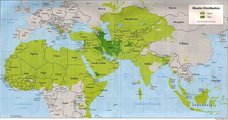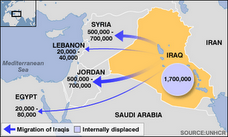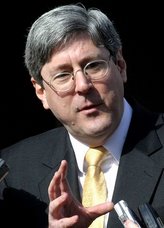 “political process” in Iraq.
“political process” in Iraq.Furthermore, the newspaper quoted Sami al-'Askari, a Maliki advisor, as saying that the Prime Minister discussed the matter of the 'Allawi front with Talabani and Barazani during a recent visit to Kurdistan.
Pro-government al-Mada also discussed the prime minister’s statements. The paper quoted Maliki as warning the “conspirators” that “the era of coups d’état has passed with the (departure of) the previous regime” and that “there is no place for conspiracies.”
In parallel to these fiery political statements, Maliki and other high-level members of the ruling establishment have been insinuating that their political opponents are involved in illicit activities, and are threatening to “reveal” incriminating information about them.
Pan-Arab al-Sharq al-Awsat reported today on al-Maliki announcing that “domestic and regional parties” are involved in the sabotage of the Iraqi oil infrastructure. Al-Maliki also warned that the government “may find itself compelled” to name the parties in such activities.
Also, in a speech given to Iraqi generals and reported by al-Mada and Az-Zaman, Maliki made links between the plots that are allegedly woven against him and “terrorism” in Iraq, and called on the army to prevent the conspirators from undermining the political process. “These people (the ‘accused’ in Maliki’s statements remain unidentified, but easily identifiable) have crossed the stage of conspiracies to the stage of disrupting security and supporting terrorism,” the Prime Minister said, according to al-Mada.
Back to the 'Allawi front, contrary to al-Mada's report yesterday predicting the downfall of the nascent alliance, Az-Zaman published a story today indicating that 'Allawi’s “front” is alive and well, and expanding.
The newspaper said that it was informed by sources in Cairo that Tariq al-Hashimi (the Iraqi vice-President and leader of the Islamic Party, one of the main constituents of 'Allawi’s coalition) informed the Egyptian president that “numerous political parties in Iraq are ready to announce a broad, moderate front aiming to salvage the situation in Iraq.”
Another spokesman of the Islamic Party told Az-Zaman that the new coalition is intended to “oppose sectarianism.” Futhermore, the paper added that talks are being held with the Shi'a Fadhila party and the Sadrist Current to join the anti-Maliki front. A leader in the Islamic Party told the newspaper that “the Sadrist Current is the closest movement to the ideas we adopt.”
In addition to 'Allawi’s parliamentary list, and several Sunni parties, the new anti-Maliki coalition is rumored to include Kurdish parties that are opposed federalism and to the mainstream Kurdish leadership, as well as several smaller parties and independent deputies. The “front” may also include a Kurdish politician -– Arshad Zibari -– who was a minister in Saddam’s administration. Az-Zaman added that Zibari, who enjoys a measure of popular support in Nineveh, had organized pro-Saddam Kurdish militias and fought many battles against the forces of Barazani and Talabani during Saddam’s rule.
It is also worthy to mention that Az-Zaman’s coverage of the anti-Maliki coalition was restricted to the London-based international edition of the publication and did not figure in the Iraq edition. As a general rule, news items that are deemed “polemical” or critical of powerful parties and politicians often get left out from the Baghdad print.
Pro-government al-Mada also discussed the prime minister’s statements. The paper quoted Maliki as warning the “conspirators” that “the era of coups d’état has passed with the (departure of) the previous regime” and that “there is no place for conspiracies.”
In parallel to these fiery political statements, Maliki and other high-level members of the ruling establishment have been insinuating that their political opponents are involved in illicit activities, and are threatening to “reveal” incriminating information about them.
Pan-Arab al-Sharq al-Awsat reported today on al-Maliki announcing that “domestic and regional parties” are involved in the sabotage of the Iraqi oil infrastructure. Al-Maliki also warned that the government “may find itself compelled” to name the parties in such activities.
Also, in a speech given to Iraqi generals and reported by al-Mada and Az-Zaman, Maliki made links between the plots that are allegedly woven against him and “terrorism” in Iraq, and called on the army to prevent the conspirators from undermining the political process. “These people (the ‘accused’ in Maliki’s statements remain unidentified, but easily identifiable) have crossed the stage of conspiracies to the stage of disrupting security and supporting terrorism,” the Prime Minister said, according to al-Mada.
Back to the 'Allawi front, contrary to al-Mada's report yesterday predicting the downfall of the nascent alliance, Az-Zaman published a story today indicating that 'Allawi’s “front” is alive and well, and expanding.
The newspaper said that it was informed by sources in Cairo that Tariq al-Hashimi (the Iraqi vice-President and leader of the Islamic Party, one of the main constituents of 'Allawi’s coalition) informed the Egyptian president that “numerous political parties in Iraq are ready to announce a broad, moderate front aiming to salvage the situation in Iraq.”
Another spokesman of the Islamic Party told Az-Zaman that the new coalition is intended to “oppose sectarianism.” Futhermore, the paper added that talks are being held with the Shi'a Fadhila party and the Sadrist Current to join the anti-Maliki front. A leader in the Islamic Party told the newspaper that “the Sadrist Current is the closest movement to the ideas we adopt.”
In addition to 'Allawi’s parliamentary list, and several Sunni parties, the new anti-Maliki coalition is rumored to include Kurdish parties that are opposed federalism and to the mainstream Kurdish leadership, as well as several smaller parties and independent deputies. The “front” may also include a Kurdish politician -– Arshad Zibari -– who was a minister in Saddam’s administration. Az-Zaman added that Zibari, who enjoys a measure of popular support in Nineveh, had organized pro-Saddam Kurdish militias and fought many battles against the forces of Barazani and Talabani during Saddam’s rule.
It is also worthy to mention that Az-Zaman’s coverage of the anti-Maliki coalition was restricted to the London-based international edition of the publication and did not figure in the Iraq edition. As a general rule, news items that are deemed “polemical” or critical of powerful parties and politicians often get left out from the Baghdad print.





No comments:
Post a Comment